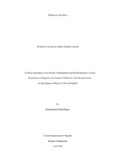Please use this identifier to cite or link to this item:
https://elibrary.tucl.edu.np/handle/123456789/3244Full metadata record
| DC Field | Value | Language |
|---|---|---|
| dc.contributor.author | Magar, RanaBahadurGharti | |
| dc.date.accessioned | 2018-05-02T09:35:09Z | |
| dc.date.accessioned | 2021-07-23T04:29:46Z | - |
| dc.date.available | 2018-05-02T09:35:09Z | |
| dc.date.available | 2021-07-23T04:29:46Z | - |
| dc.date.issued | 2016-04 | |
| dc.identifier.uri | http://elibrary.tucl.edu.np/handle/123456789/3244 | - |
| dc.description.abstract | A final point that must be made about Huxley is that he by no means was antitechnology; his primary concern was simply technology uncontrolled by humankind and the effects of technological determinism on the transnational social situation. He was both a defender and a critic of technology, and invested his energy and time to making, sharing, and inspiring discourse on these issues. He advocated for a rich universal culture. Machinery has set up a tendency towards the realization of fuller life, but he realized that these possibilities and tendencies are unattainable as long as people are cogs instead of operators of the machine. He knew all too well that at the core of human interactions, developments, and sustenance was a mechanized master that determined the nature and type of relationships, the direction and speed of their growth, and the quality of their lives. | en_US |
| dc.language.iso | en_US | en_US |
| dc.publisher | Central Department of English Kirtipur, Kathmandu | en_US |
| dc.subject | Feminism | en_US |
| dc.subject | Socio-culture | en_US |
| dc.subject | Political System | en_US |
| dc.title | Feminist Overtone in Aldous Huxley's Island | en_US |
| dc.type | Thesis | en_US |
| Appears in Collections: | English | |
Items in DSpace are protected by copyright, with all rights reserved, unless otherwise indicated.

